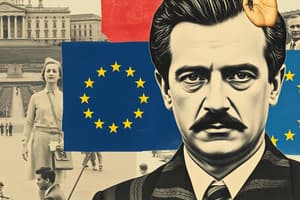Podcast
Questions and Answers
Which policy demonstrates France's role as a key influencer within the EU?
Which policy demonstrates France's role as a key influencer within the EU?
- Leading peacekeeping operations in Africa.
- Strict border policies with Schengen Area countries.
- Maintaining one of Europe's largest militaries.
- Legislation related to climate and trade. (correct)
How does France balance its foreign policy interests given its independent stance?
How does France balance its foreign policy interests given its independent stance?
- By prioritizing military interventions in the Middle East.
- By aligning its policies strictly with EU directives.
- By focusing solely on its relationships with former colonies in Africa.
- By navigating tensions among the United States, Russia, and China. (correct)
What impact have terror attacks and accusations of police brutality had on public perception of law enforcement in France?
What impact have terror attacks and accusations of police brutality had on public perception of law enforcement in France?
- They initially improved police reputation following the 2015 attacks, but tensions have since resurfaced due to brutality accusations. (correct)
- They have had no significant impact due to the independent operations of the Police Nationale and Gendarmerie.
- They led to a complete overhaul of the French legal system.
- They have consistently diminished public trust in both the Police Nationale and the Gendarmerie.
How does the semi-presidential system in France function in practice?
How does the semi-presidential system in France function in practice?
What is a key challenge related to immigration in France?
What is a key challenge related to immigration in France?
Which factor most significantly explains France's adoption of a semi-presidential system?
Which factor most significantly explains France's adoption of a semi-presidential system?
What is the significance of Article 34 in the French legislative process?
What is the significance of Article 34 in the French legislative process?
How do the Police Nationale and Gendarmerie Nationale differ in their responsibilities?
How do the Police Nationale and Gendarmerie Nationale differ in their responsibilities?
What characterizes France's approach to social welfare spending compared to other OECD countries?
What characterizes France's approach to social welfare spending compared to other OECD countries?
What is a key feature of France's labor and tax system?
What is a key feature of France's labor and tax system?
How does France's involvement in Africa manifest in its foreign policy?
How does France's involvement in Africa manifest in its foreign policy?
What is the role of the Constitutional Council in the French government?
What is the role of the Constitutional Council in the French government?
Knowing that France has a trade deficit, which statement must be true?
Knowing that France has a trade deficit, which statement must be true?
If a baker broke the law dictating how baguettes must be made and sold, which branch of the French government would be responsible for enforcing the law?
If a baker broke the law dictating how baguettes must be made and sold, which branch of the French government would be responsible for enforcing the law?
How does the structure of the French education system balance national standards with local needs?
How does the structure of the French education system balance national standards with local needs?
Flashcards
France's Role in the UN
France's Role in the UN
One of the five permanent members of the UN Security Council, possessing veto power.
France's Role in the EU
France's Role in the EU
France is a key influencer in legislation, climate, trade, agriculture, migration, and the digital economy.
France's Foreign Policy
France's Foreign Policy
Balances relations between the US, Russia, and China.
Immigration Challenges in France
Immigration Challenges in France
Signup and view all the flashcards
Main Industries in France
Main Industries in France
Signup and view all the flashcards
France's Agricultural Exports
France's Agricultural Exports
Signup and view all the flashcards
Key French Companies
Key French Companies
Signup and view all the flashcards
Standard Work Week in France
Standard Work Week in France
Signup and view all the flashcards
Key Components of French Welfare
Key Components of French Welfare
Signup and view all the flashcards
Duration of Unemployment Benefits
Duration of Unemployment Benefits
Signup and view all the flashcards
Police Nationale
Police Nationale
Signup and view all the flashcards
Gendarmerie Nationale
Gendarmerie Nationale
Signup and view all the flashcards
Civil Law System
Civil Law System
Signup and view all the flashcards
French Court Structure
French Court Structure
Signup and view all the flashcards
Presumption of Innocence
Presumption of Innocence
Signup and view all the flashcards
Study Notes
France & the EU
- France is a founding member of the EU, formerly known as the European Economic Community.
- The country has the EU's 2nd largest economy and the world's 7th largest.
- France is a key influencer in the EU, particularly in legislation, climate, trade, agriculture, migration, and the digital economy.
- The Paris Climate Agreement was established in 2015.
- France has 45 UNESCO sites; 39 are cultural, 5 are natural, and 1 is mixed.
- In regards to EU reforms and economic policy, France works closely with Germany.
- France is a Eurozone member that supports EU integration and unity.
France & the UN
- France is one of five permanent Security Council members and possesses veto power.
- France plays a major role in peacekeeping and conflict resolution.
- Peacekeeping operations have been led in Africa and the Middle East.
- Advocacy for human rights and conflict resolution are important.
Military Power
- France has one of Europe's largest militaries.
- The country is a NATO leader.
- Global operations occur, especially in Africa and the Middle East.
- France has nuclear power capabilities.
Foreign Policy
- France has an independent foreign policy, balancing tensions between the United States, Russia, and China.
- Aid is actively provided, especially in Africa and former colonies.
- French language and culture is promoted through Alliance Française & La Francophonie.
Immigration
- Historical immigration has come from Africa, Maghreb, and Indochina.
- Integration, jobs, discrimination, housing, and education are ongoing challenges.
- Debates surround secularism, Islam, burqa bans, halal food, and national identity with immigration.
- 10% of the population consists of people born as foreigners.
- 20% of French people have at least one foreign parent or grandparent.
- 44% of immigrants are from Africa, while 14% are from Asia.
- 6% of all foreigners are refugees.
- There were 600,000 refugees in 2022, with France as the main asylum host.
- Strict border policies are in place with the Schengen Area, making the asylum process long and difficult.
- France used to be the most open EU country for immigration, but this is no longer the case.
Economy
- The GDP is $3 trillion (2024) with a 1.3% growth rate.
- Paris Agreement investments total €50 billion per year.
- The unemployment rate is 7.1% overall, with 18% among youth.
- Inflation is at 4.5%.
- The public debt is €3.3 trillion.
- The trade deficit consists of €650 billion in exports and €740 billion in imports.
- Key trade partners include Germany, China, the US, and the EU.
- The budget deficit is 4.9% of GDP.
- Main industries include tourism, defense, energy, fashion, space research, agriculture, transport, and aircraft.
- France is the largest agricultural exporter in Europe, with €74 billion in exports per year, including wheat, wine, and dairy.
- Tourism revenue generates €60 billion per year.
- Key companies include Airbus (aerospace), Renault & Peugeot (automotive), and LVMH (luxury).
- A weakness is the small amount of exporting companies, loss of competitiveness and market share, small product range, and a lack of innovation efforts.
- France initiated the G-20, hosts the OECD, and is a member of the G-7 and World Trade Organization.
Labor & Taxes
- A standard work week is 35 hours.
- The minimum wage is €1,766 per month (€11.06 per hour gross, €8.76 per hour net).
- Union membership is 8%, but strikes are common.
- Income tax rates include 0% for income under €10,225 and 45% for income over €160,336.
- Social security was established in 1945, with CMU in 2019.
- Taxes are collected by the government at the source since 2019.
- A succession tax exists.
- Strikes often precede negotiations, especially concerning state-owned companies like transportation, raising the retirement age, or adjusting benefits.
- The country has the weakest union representation in Europe with only 11% of employees in unions.
Welfare
- France has the highest welfare spending in the OECD (32% of GDP).
- Universal healthcare coverage is 99%, costing €270 billion per year.
- Family support totals €52 billion per year.
- Social housing expenditures are €18 billion per year.
- Unemployment benefits last for 2 years, costing €40 billion per year.
- 14% of GDP is spent on pensions.
- Minimum pension guarantees exist for those with low wages, intermittent careers, parents, and those facing unemployment.
- Maternity leave is 16 weeks, while paternity leave is 25 days.
- Free hearing aids, glasses, and dental care are provided.
- The retirement age is 64.
- There are 1.7 workers per retiree (2024), leading to financial strain.
- There are 42 different pension schemes, causing inefficiencies and disparities.
Law Enforcement
- A dual law enforcement system exists, with police forces nationalized in 1851.
- Police Nationale is a civilian police force responsible for crime investigation, counter-terrorism, and immigration in urban areas, created in 1941.
- There are 125,000 officers under the Ministry of the Interior.
- Gendarmerie Nationale is a military police force responsible for rural areas and national security.
- Works under the Ministry of Armed Forces.
- Police Municipale is a municipal police force with 10,000 officers operating in 2,860 localities.
- Other forces include GIGN (SWAT), PAF (border patrol), RG (intelligence), PJ (criminal investigation), SDT (espionage), RAID (anti-terrorism), CSP (guard government buildings), Douane (trade & smuggling), CRS (crowd, riot, beaches).
Public Safety
- Police can stop and demand identification at any time.
- Individuals can be detained for 24 hours without charge, with access to a lawyer within three hours.
- Detention can be extended up to five days for state security offenses.
- Officers can issue on-the-spot fines for traffic offenses.
- Every French resident has a police record, even if blank.
- Lost or stolen property must be reported to police within 24 hours for insurance claims.
Public Perception
- The 2015 Paris terror attacks improved police reputation, but tensions have since risen.
- Accusations of police brutality and racism have led to riots.
- The government aims to improve cooperation between the Police Nationale and Gendarmerie, though they traditionally operate separately.
Legal System
- The legal system is based on civil law, using written codes and statutes rather than case law.
- Judicial independence exists, with courts operating without executive interference.
- It operates an inquisitorial system where judges play an active role in investigations.
Court Structure
- Tribunal de Police handles minor offenses.
- Tribunal Correctionnel deals with more serious cases with a judge but no jury.
- Cour d'Assises handles major crimes, with a panel of 9 random citizens and 3 judges.
- Conseil d'État is an administrative court for government-related disputes.
Judges & Prosecutors
- Judges conduct investigations and oversee trials.
- Prosecutors represent the state in criminal cases.
Presumption of Innocence
- As stated in the 1958 Constitution, Article 66, all accused individuals are presumed innocent until proven guilty.
- The prosecutor must prove guilt.
- Conviction requires guilt beyond a reasonable doubt.
Penalties
- Minor infractions incur fines ranging from €35 to €3,000.
- More serious offenses result in fines from €3,750 to 10 years in prison.
- Major offenses can lead to sentences of 10 years to life.
- Life sentences are possible.
- Inmates serving life may apply for parole after 18 years (22 years for repeat offenders).
- Only four people have received true life sentences in France.
- In cases of child murder with rape/torture, the court may extend sentences up to 30 years or deny parole.
- The death penalty has been abolished since 1981.
Prison
- A new record of 74,513 incarcerated people was recorded as of July 2023, with a density of 123%.
- Female prisoners make up 3.3% of the population and are in overcrowded and under-equipped prisons.
- There are 60,666 operational prisons.
- Short Stay Prisons house defendants waiting for trial or those sentenced to less than 2 years, and are mostly overcrowded with a rate of 130%.
- There are 25 Detention Centers for inmates with the highest chance of social reintegration.
- There are 6 Central Houses, which are high-security facilities for long-term, dangerous prisoners.
- 9 Semi-Release Centers allow inmates to leave for work or rehabilitation programs.
- 59 Large Penitentiary Centers contain multiple facilities with varying detention regimes.
Strange Laws
- Illegal Laws:
- Women wearing pants in Paris was illegal until 2013
- Alcohol in a place of work, except beer, wine, and cider while eating is illegal
- Disinheriting your children is illegal
- Child beauty pageants are illegal
- Religious symbols (headscarves & crosses) in public schools are illegal
- Swimming shorts in public pools are illegal
- Desk lunches are illegal
- Mowing your lawn on Sunday afternoon is illegal
- Legal Laws:
- Marrying a dead person is legal
- Rules:
- Law dictates how bakers make and sell a baguette
- Gilet jaune and a triangle must be in your vehicle
- 40% of music on radio stations must be played in French
Executive Branch
- President:
- The President is the Head of State and Executive
- They can dismiss the National Assembly, chairs the Council of Ministers, leads foreign policy, negotiates, and ratifies treaties, heads the Armed Forces, can call referenda and enforce laws, and has a limited suspensive veto.
- Article 16 allows the President to assume emergency powers, concentrating all state power in the presidency.
- All domestic decisions must be approved by the Prime Minister, with power depending on parliamentary majority.
- Prime Minister:
- The Prime Minister is appointed by the President but must be accepted by Parliament.
- If opposition parties dominate Parliament, the President must appoint a Prime Minister from the opposition, a policy started in 1986.
- The Prime Minister determines governmental policy, controls the civil service and armed forces, and internal policies are increasingly led by the Prime Minister since the 1970s.
Legislative Branch
- National Assembly: Lower House.
- This house has the final say in legislative process and specializes in scrutinizing government business.
- Senate: Upper House.
- Has 348 senators serving 6-year terms.
- Senators are indirectly elected by local officials and French citizens abroad.
- Specializes in constitutional matters & foreign affairs (including European integration).
- The legislative process involves both houses, but the National Assembly prevails.
- Article 34 states that Parliament controls civil law, fiscal law, penal law, elections, civil liberties, labor laws, amnesty, and the budget.
Judicial Branch
- Constitutional Council, like the Supreme Court.
- Composed of 9 members appointed for 9-year terms: 3 by the President, 3 by the National Assembly, and 3 by the Senate.
- Oversees parliamentary & presidential elections, reviews constitutionality of laws, and is consulted on international agreements & disputes between government and Parliament.
Why Semi-Presidential System?
- France lacked stability under the Third & Fourth Republics.
- The 1958 Constitution created a mixed system.
- Parliamentary elements (Prime Minister accountable to Parliament).
- Presidential elements (President elected by universal suffrage).
Key Constitutional Changes
- 1958: Fifth Republic established.
- 1962: President elected by direct universal suffrage.
- 1999: Recognized International Criminal Court.
- 2000: Presidential term shortened from 7 to 5 years.
- 2024: Adoption of Freedom of Abortion Law.
Elections
- Elections are held on Sundays (2-round system).
- Voting is NOT mandatory.
- Voters can cast a blank vote ('vote blanc') as a form of protest.
- Abstention rates are increasing.
Election Terms
- Presidential: 5 years.
- Legislative: 5 years, 577 National Assembly members.
- Regional: 6 years. Regional councils in mainland & overseas France.
- Municipal: 6 years, 36,000 communes elect mayors & councils.
- Cantonal: 4 years, 2,054 cantons (subdivisions of departments).
Political Parties
- Centralist: LREM
- Right-wing: LR
- Far-right: RN
- Left-wing: LFI, PS
Local Government
- Regions:
- There are 18 regions, including 13 mainland and 5 overseas.
- Special status regions include Corsica (greater autonomy), Paris, Lyon, and Marseille (unique administration).
- Since 1982, regions have power over economic/social development, education, & culture.
- Departments:
- Established in 1790, it is the main intermediate government level.
- There are 101 departments, including 96 mainland and 5 overseas.
- Run by General Councils (elected for 6 years).
- Responsibilities include welfare, health, employment, and local regulations.
- Communes:
- The smallest unit of government with roots in the ancien régime.
- Governed by municipal councils.
- The Mayor is the chief executive & government representative.
- A 1982 reform reduced central government supervision.
Political Issues
- Pension reforms & protests.
- Immigration & integration debates.
- Environmental policies & energy transition.
- Rise of far-right & populism.
Fun Facts
- The last guillotine execution was in 1977.
- There have been 15 constitutions since 1789.
- The May 1968 protests almost collapsed the government.
- Since 2000, equal male/female candidates have been required.
- Protests are a national tradition.
- Presidents Mitterrand & Giscard d'Estaing were published writers.
Education
- Highly Centralized: Managed by the French Ministry of Education.
- Mandatory and Free: Ages 3 to 16.
- Standardized Curriculum: Consistent across the country.
- Strong focus on French language and civic education, emphasis on secularism in public schools, rigorous national exams.
Primary Education
- Preschool: Ages 3–6.
- Elementary School: Ages 6-11.
- Subjects Taught: French, Math, Basic Sciences, History, Geography, Arts, and Introduction to a foreign language (typically English).
Secondary Education
- Middle School, Ages 11-15.
- Ends with DNB.
- Exam: Brevet des Collèges testing core subjects.
- High School, Ages 15–18.
- Tracks: General (academic-focused), technological (applied sciences & industry), or vocational (practical job training).
- Exams: Baccalauréat (university admission) or Concours (Grandes écoles).
Higher Education
- Universities: Licence, Master, Doctorat.
- Grandes Écoles: Prestigious, competitive institutions for specialized fields, similar to Ivy League schools.
- Other Institutions: Schools for arts, design, and technology.
Historical Backgrounds of Education
- 1804-1815: Napoleon's First Empire established a centralized education system.
- 1881: Free and compulsory primary and secondary education (ages 6-13).
- 1959: Extended mandatory schooling to age 16.
- 1963: Secondary education in Collèges became accessible to all.
- 2019: Lowered starting age for mandatory schooling to 3 years old.
School Structure
- State Schools: Fully government-funded and controlled.
- State-Funded Private Schools: Must adhere to the national curriculum; teachers are paid by the state.
- Privately Funded Schools: Subject to government inspection.
- Geographic School Assignment: Public school placement is determined by residence.
- No School Board Elections: Parents have limited influence over teaching.
Teaching in Education
- Teacher-student relationships are strict and formal.
- There are longer School Days, often including a full or half-day closure on Wednesdays.
- No School Uniforms are required at any education level.
- Limited Extracurricular Activities, with no school sports teams or clubs due to funding focus on academics.
- A Grading System Out of 20 is used.
Costs and Access to Education
- There are 79 Public Universities, 227 Engineering Schools, and 220 Business Schools known as Grandes Écoles.
- Public Universities:
- These are essentially free, with students paying low administrative fees.
- Bachelor's: €170 per year.
- Master's: €243 per year.
- Doctorate: €380 per year.
- Engineering: €610 per year.
- These are essentially free, with students paying low administrative fees.
- Private Universities: Average €10,000 per year.
Academic Performance
- Diploma Success Rates (2023):
- Brevet des Collèges: 89.1% pass rate.
- Baccalauréat: 90.9% pass rate.
- France in Global Education Rankings:
- OECD PISA Ranking: 26th out of 41 countries (2023).
- Reading, Literacy, Math, Science Score: 494 (above the OECD average of 488).
- 71 Nobel Prize winners—the 4th highest globally.
School Schedule
- 36 weeks or 180 days of school.
- There are 8-9 weeks of summer break.
- There are 2 weeks each for Fall, Christmas, Winter, and Spring breaks.
- 26-28 hours of school weekly.
- Class size:
- Secondary: 25.8.
- High school: 30.4.
Pros and Cons of Education
- Education is highly structured and academically rigorous. Universally free education. There is a strong focus on civic education and national unity.
- Limited extracurricular activities exist, with no graduation ceremonies and a rigid system that tracks students early into specific educational paths.
Studying That Suits You
Use AI to generate personalized quizzes and flashcards to suit your learning preferences.




